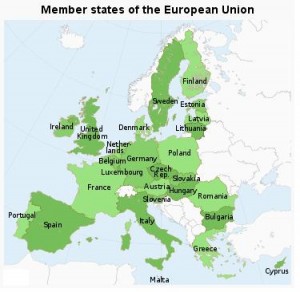Barnier To Endorse Spanish-style Internet Policing For EU
By EurActiv
The European Commission is contemplating making Internet providers police their networks to tackle illegal downloads, a highly contested measure which is currently being scrutinised by the European Court of Justice.
Sources close to the Commission claim that the EU executive will try and replicate a Spanish law which forces Internet providers to come down hard on users for making illegal downloads.
A draft of the EU’s upcoming Intellectual Property Rights strategy, due out on 24 April, will reportedly announce upcoming amendments to existing EU law that “should tackle the infringements at their source and, to that end, foster cooperation of intermediaries, such as Internet service providers”.
ISPs fear worst
The wording of the text has scared Internet providers who have long campaigned against any entanglement in monitoring or preventing Internet piracy. EU sources familiar with the matter claim this will be done in an update of the eCommerce Directive and the Intellectual Property Rights Enforcement Directive later this year.

The open Internet advocacy group, la Quadrature du Net, has often argued that infringements should be treated like any other crime in a court of law – innocent until proven guilty – and not on an ad-hoc basis executed by industry players.
Ever since a row broke out over a controversial French law, called Hadopi, the EU has been beavering away at ways to stop illegal file-sharing online, claiming it causes substantial losses to rightsholders represented by record companies.
Internet providers and collecting societies are at loggerheads on the issue but sources claim that the latter will win because CISAC, the French collecting society, is successfully lobbying their compatriot, Michel Barnier, the commissioner for the internal market responsible for intellectual property policymaking.
The Spanish connection
A source close to the Commission claims that it is quite clear now that Barnier wants to follow the example of Spain, where a law was adopted by the Spanish parliament on 15 February.
The Sinde law establishes a government commission which should provide courts with details of websites offering access to copyright-protected material such as music, movies, video games or software. A judge can then order the closure of offending websites.
Allegedly, Spain is the piracy capital of Europe. In 2008 illegal movie downloads reached 350 million copies, while in the same year 1.2 billion tracks were downloaded via filesharing.
“People think they are not hurting anyone because the most visible people in Hollywood are already rich. The truth is they are killing jobs for people who work cameras, catering, engineering, shipping departments, etc.,” said Scott Meath from the Royalty Free Music Library, which defends tougher copyright protection in Spain.
Global anti-piracy talks
The industry lobby’s grievances are the subject of global talks in a bid to get Internet providers to “co-operate” on illegal downlading.
A leaked draft of the global anti-piracy treaty ACTA, which caused an outcry among ISPs, spoke of criminal sanctions for Internet providers which aid or abet copyright infringements.
The European Court of Justice is currently reviewing the text at the request of the European Parliament. Just days ago a letter from the music and film industry asking MEPs to halt the ECJ’s proceedings was revealed on a website called IPtegrity.
Eircom’s precedent
Sources predict that if the Commission and ACTA get their way then Internet providers will become a private police with no choice but to impose sanctions on users with measures like filtering, take-downs and restrictions on access.
Their fears are not without precedent. Ireland is the first country to introduce filtering after Internet service provider Eircom caved into the pressure of a lawsuit filed against it by the music industry.
In Belgium there is an identical legal battle. Belgian collecting society Sabam has asked Internet provider Scarlet to filter access to certain websites but a recent opinion from the court signalled it would not follow Ireland’s example.
